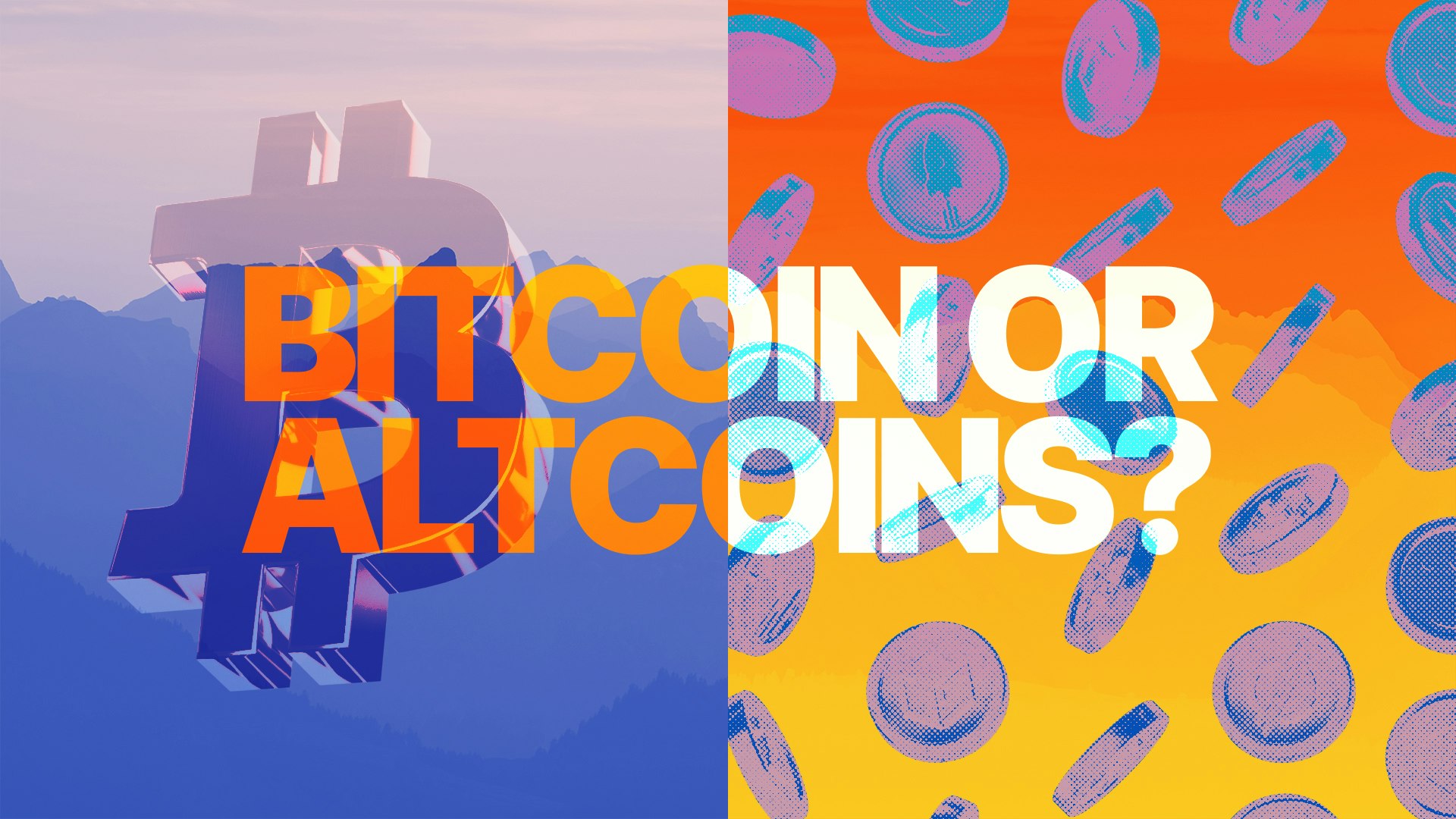Don’t invest unless you’re prepared to lose all the money you invest. This is a high‑risk investment and you should not expect to be protected if something goes wrong.
Buy Bitcoin vs. Altcoins: Why Start with Bitcoin?
There are now many cryptocurrencies on the market. But should you still start with Bitcoin?
In this article...
- With so many cryptos on the market, where should you start?
- Bitcoin, as the ultimate OG, may be a good starting point
- Here are some thoughts about Bitcoin as your starter crypto

There are many cryptocurrencies, all competing for our attention. Obviously, the first and original, , is still the most popular. This is despite other cryptos becoming well-known and having interesting use cases. Among the thousands of options vying for attention, like Ethereum, XRP, Cardano, Solana, and others, Bitcoin stands as the unchallenged pioneer.
But why begin with Bitcoin?
Bitcoin the OG: The foundational role
Bitcoin, introduced in 2009 by the enigmatic , was not just the first cryptocurrency. It is the blueprint on which the entire cryptocurrency ecosystem models itself on.
Bitcoin's creation introduced blockchain technology, a decentralised ledger that records transactions securely and transparently without the need for intermediaries like banks. This innovation sparked the proliferation of alternative cryptocurrencies, often dubbed “altcoins,” each attempting to carve out a niche. Yet, Bitcoin remains the gold standard. It has the largest market capitalisation and the widest recognition globally.
Stability in a volatile market
The invention of crypto was a stroke of genius. But it ain’t perfect. Cryptocurrencies are notorious for their price volatility. While altcoins like Dogecoin or Solana may experience meteoric rises (and equally dramatic falls), Bitcoin does at least have longevity. It has stayed alive for over 15 years, weathering market cycles.
This is not to say Bitcoin is immune to fluctuations. But its larger market presence and established infrastructure provide a buffer against the wild swings often seen in less mature projects.
Bitcoin’s track record might offer a safer harbour to learn the ropes. While grappling with wallet security, transaction fees, and market trends, Bitcoin may offer a more established option for beginners, though it is still subject to significant price volatility, and investors should carefully consider the risks.

Why buy Bitcoin first: Network effects and adoption
One of Bitcoin’s most compelling strengths lies in its network effects. In economics, a network effect occurs when a product’s value increases as more people use it.
Bitcoin works with this principle, as it is accepted by more and more merchants, integrated into payment systems, and supported by hardware and software solutions. From buying a coffee to investing through institutional mainstream platforms, is growing.
This means it has practical advantages for beginners. Setting up a Bitcoin wallet, purchasing fractional amounts (known as satoshis), and finding reliable exchanges are straightforward processes. This is thanks to the coin’s maturity compared to other cryptos.
A store of value: Bitcoin as “digital gold”
Beyond its use as money, Bitcoin is seen by some as a store of value, often likened to the digital version of gold. Its supply is capped at 21 million coins, a scarcity hardcoded into its protocol.
This is the opposite of fiat currencies. More money can be printed at any time, devaluing the existing pool of fiat already in circulation.
Altcoins, while innovative, often lack this defining trait. Many have uncapped supplies or complex issuance models that dilute their long-term value proposition.
While excels in smart contracts and decentralised applications, and focuses on cross-border payments, Bitcoin’s simplicity makes it a good potential starting point for learning about crypto investing.
The learning curve: Bitcoin as a gateway
Bitcoin can act as a gateway to understanding the broader cryptocurrency ecosystem. Grasping its blockchain fundamentals equips you to explore .
Starting with Bitcoin is about building a foundation. As you master its mechanics, like the ethos of decentralisation, you’ll find the transition to altcoins smoother.

Adoption as a reserve
An interesting step in the evolution of cryptocurrencies is that the US government plans to add cryptocurrencies to the coffers owned by the American taxpayers.
The U.S. Crypto Strategic Reserve involves the U.S. government establishing a reserve of seized cryptocurrencies that came from crime activities. They have started with Bitcoin, with to hold on to other cryptocurrencies in the future in a separate “Digital Asset Stockpile.”
Proponents suggest this reserve would position the U.S. as a leader in financial innovation and enhance national economic security. There's also the idea that it provides a level of legitimacy to the crypto market.
If Bitcoin was adopted as a parallel currency, this might affect market perception and demand.
Conclusion: Buy Bitcoin as a starting point
The cryptocurrency landscape offers a buffet of altcoins. But Bitcoin's foundational role, and potential as a digital store of value make it an ideal starting point for anyone wanting to enter the world of crypto, but proceed with caution, Bitcoin still remains a high risk, and volatile investment.
With potential adoption as a reserve asset, Bitcoin reinforces its position as a cornerstone of the evolving financial landscape.

Suggested Articles
What is Bitcoin (BTC)? What is "Digital Gold" Used For?
What is Bitcoin? It is a digital currency that can be traded, exchanged, and used as a form of payment independent of central banks and governments.What is Ethereum? What is ETH Used For?
Ethereum is a decentralised blockchain-based open-source software platform that allows for the development of decentralised applications (dApps).What Is Crypto? How do Cryptocurrencies Work?
Crypto has become incredibly popular. But how does this digital currency work? And are there cryptos other than Bitcoin?Browse by topic



Cryptoassets traded on CoinJar UK Limited are largely unregulated in the UK, and you are unable to access the Financial Service Compensation Scheme or the Financial Ombudsman Service.
We use third party banking, safekeeping and payment providers, and the failure of any of these providers could also lead to a loss of your assets. We recommend you obtain financial advice before making a decision to use your credit card to purchase cryptoassets or to invest in cryptoassets. Capital Gains Tax may be payable on profits.
CoinJar’s digital currency exchange services are operated in the UK by CoinJar UK Limited (company number 8905988), registered by the Financial Conduct Authority as a Cryptoasset Exchange Provider and Custodian Wallet Provider in the United Kingdom under the Money Laundering, Terrorist Financing and Transfer of Funds (Information on the Payer) Regulations 2017, as amended (Firm Reference No. 928767).
Apple Pay and Apple Watch are trademarks of Apple Inc. Google Pay is a trademark of Google LLC.
This site is protected by reCAPTCHA and the and apply.